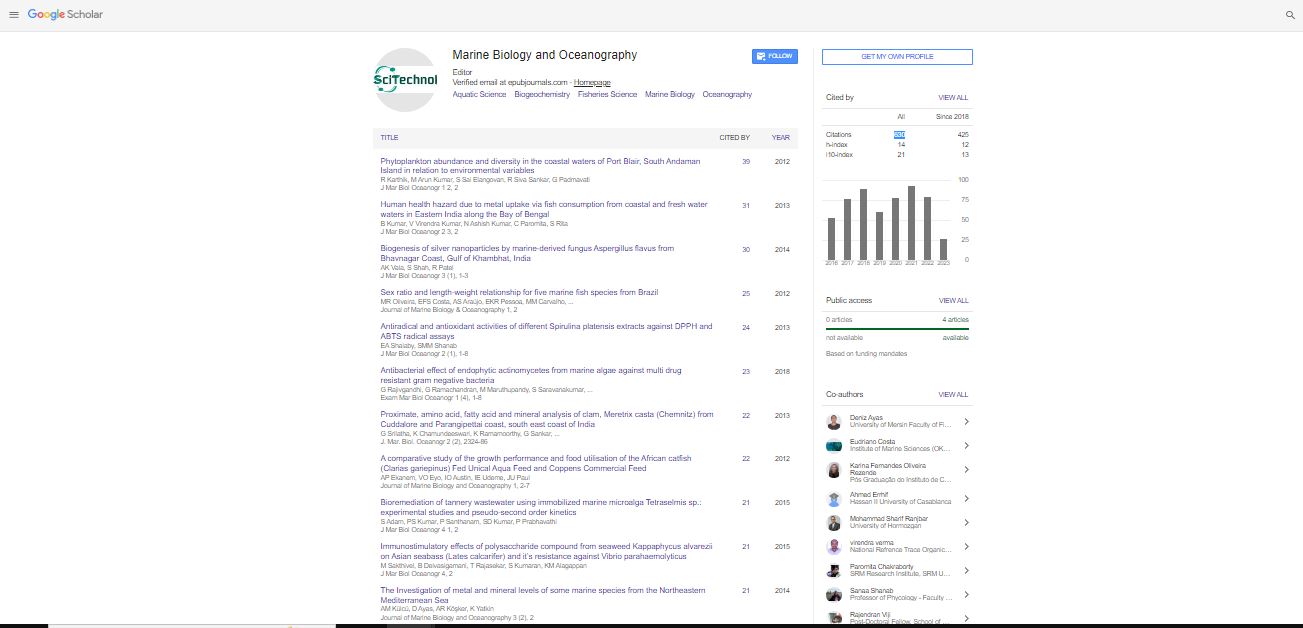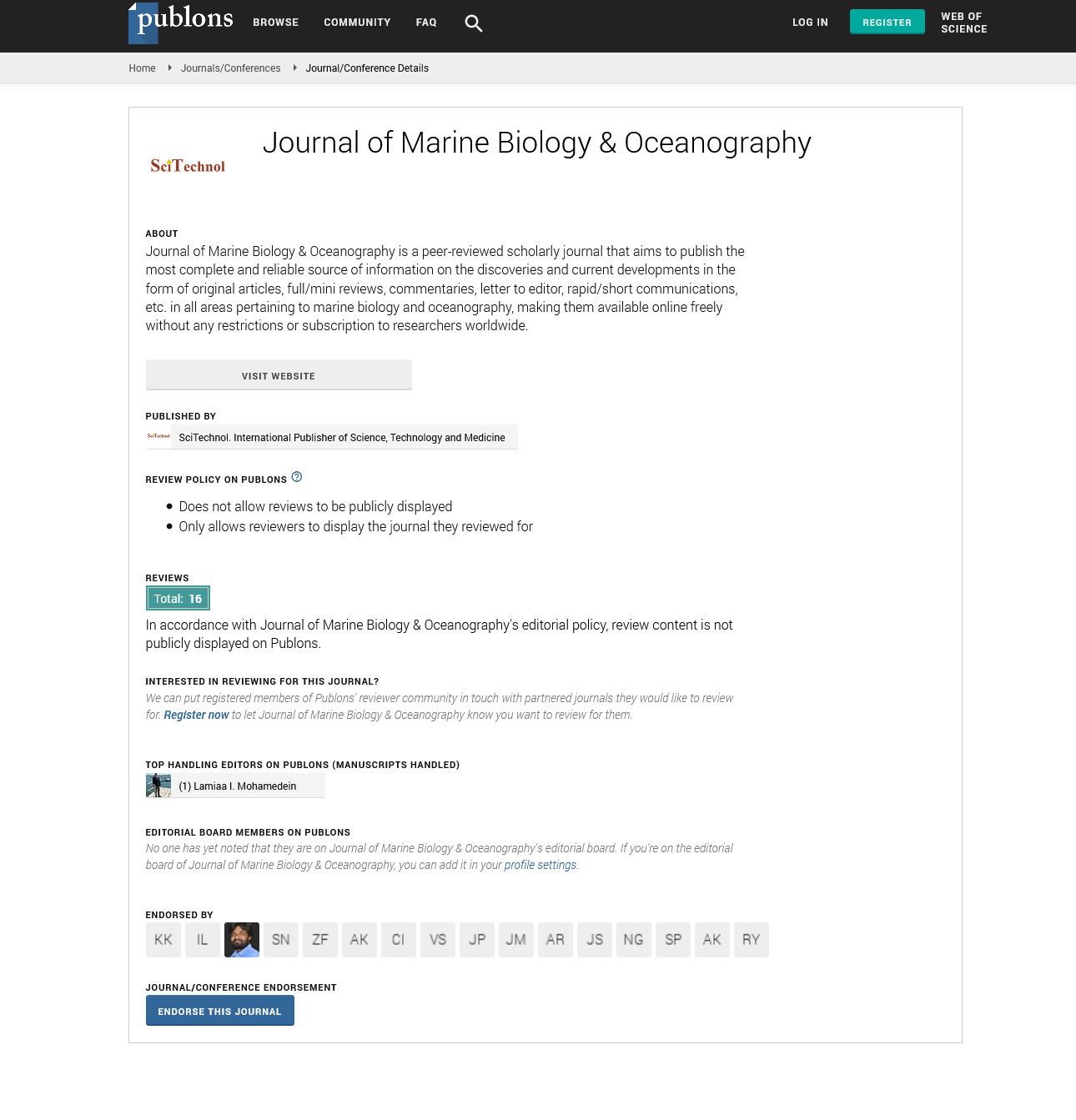Perspective, J Mar Biol Oceanogr Vol: 12 Issue: 4
Exploring the Impact and Adaptation Strategies of Coral Reefs
Marco Hussain*
1Department of Environmental Engineering, Federal University of Paraíba, Paraíba, Brazil
*Corresponding Author: Marco Hussain,
Department of Environmental
Engineering, Federal University of Paraiba, Paraiba, Brazil
E-mail: marco_hussain@fup22.br
Received date: 24 July, 2023, Manuscript No. JMBO-23-113717;
Editor assigned date: 26 July, 2023, PreQC No. JMBO-23-113717 (PQ);
Reviewed date: 10 August, 2023, QC No. JMBO-23-113717;
Revised date: 17 August, 2023, Manuscript No. JMBO-23-113717 (R);
Published date: 24 August, 2023, DOI: 10.4172/2324-8661.1000280.
Citation: Hussain M (2023) Exploring the Impact and Adaptation Strategies of Coral Reefs. J Mar Biol Oceanogr 12:4.
Description
Coral reefs are often referred to as the "Rainforests of the Sea. These vibrant underwater ecosystems, rich in biodiversity and colour, occupy less than 1% of the ocean floor but support approximately 25% of all marine species. However, the nature of coral reefs confronts the significant challenges they face in the modern world. Climate change, pollution, overfishing, and coastal development have placed these fragile ecosystems.
One of the most pressing threats to coral reefs is climate change. Rising sea temperatures trigger a phenomenon known as coral bleaching, where corals expel the symbiotic algae that provide them with essential nutrients and vibrant colours. This process weakens the corals and makes them susceptible to disease. Mass bleaching events have become more frequent and severe, causing extensive damage to reefs worldwide. Increased carbon dioxide levels in the atmosphere not only contribute to global warming but also lead to ocean acidification. This phenomenon reduces the availability of calcium carbonate, an essential building block for coral skeletons. Weakened coral structures are more vulnerable to physical damage and erosion.
Land-based pollution, including agricultural runoff and wastewater discharge, introduces excess nutrients and pollutants into coastal waters. This nutrient enrichment can lead to algal overgrowth, smothering corals, and disrupting the delicate balance of reef ecosystems. Overfishing disrupts the ecological balance within coral reef ecosystems. The removal of key predators can result in population explosions of herbivorous species, which, in turn, can devastate the coral by grazing on algae that compete with the corals for space. Coastal development, including the construction of resorts and ports, can lead to habitat destruction and sedimentation. Sediment runoff from construction sites can smother coral reefs, reducing their ability to photosynthesize and grow.
Adaptation strategies for coral reefs
While the challenges facing coral reefs came across, there is belief on the horizon. Studies and conservationists are working tirelessly to develop innovative adaptation strategies to reduce the impact of stressors and promote coral reef resilience. Coral gardening involves the propagation of coral fragments in nurseries. Once these fragments grow into healthy colonies, they can be transplanted onto damaged reefs. This technique has shown promise for restoring degraded coral reefs and increasing their resilience to environmental stressors.
Analysts are exploring the possibility of enhancing the natural adaptation of corals to changing conditions. This involves selective breeding of more heat-resistant coral strains, potentially developing "Super corals" better equipped to survive in warmer waters. The establishment of Marine Protected Areas (MPAs), where fishing and other activities are restricted or prohibited, can help protect coral reef ecosystems from overfishing and habitat destruction. Well-designed and effectively managed MPAs can enhance the resilience of coral reefs.
Efforts to reduce land-based pollution and nutrient runoff are essential for preserving water quality around coral reefs. Improved wastewater treatment, responsible agricultural practices, and better coastal management can all contribute to reducing pollution. Education and public awareness campaigns play a vital role in coral reef conservation. By fostering a sense of stewardship and emphasising the importance of responsible tourism and sustainable practices, communities can contribute to the protection of coral reefs.
Ultimately, addressing the root cause of coral reef stressors and climate change requires global cooperation to reduce greenhouse gas emissions. International agreements and commitments to limit global warming are essential to protecting coral reefs and the countless species that depend on them.
Conclusion
The challenges facing coral reefs are significant, but the preservance and innovation of conservationists and communities around the world provide a chance for their survival. By understanding the impact of stressors and implementing innovative adaptation strategies, one can work towards a future where these remarkable ecosystems continue to thrive. Coral reefs are not only essential for biodiversity but also for the livelihoods of millions of people who depend on them for food, tourism, and coastal protection. Protecting coral reefs is not just an environmental imperative, it is a global responsibility.
 Spanish
Spanish  Chinese
Chinese  Russian
Russian  German
German  French
French  Japanese
Japanese  Portuguese
Portuguese  Hindi
Hindi 
